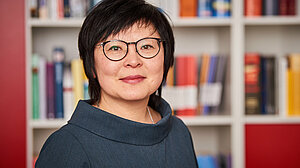Tsypylma Darieva: “Humans find new ways to move, gather, live and act together”

Which countries and which topic does your current research focus on?
Currently, I study how religious diversity and the ways of living together unfold in post-Soviet urban and migrant societies, in particular in Azerbaijan and Georgia. As an anthropologist, I look at cultural, social and political dimensions of the religious revival in public spaces. Secular and religious domains interact with each other in this dynamic and contested process. In my other project, focused on Armenians, I examined how second and later generations of migrants engage with their homeland.
What impact does the pandemic currently have on your work?
The pandemic started with cancellations, the first one arriving at the beginning of March from Leipzig Book Fare where we were supposed to present our new book on urban activism. Quickly, it became clear that not only did you have to rethink conference plans, family meetings and field trips. You needed to reconsider your existing research design and research evidences. I have realised that it costs more time and a lot of energy to participate in digital academic life. Still, beyond all limits and uncertainty, the lockdown was a creative period for me. I got additional time for writing, editing and developing new topics.
How has Covid-19 influenced your research topic / the objective of your research?
For religious communities and institutions, it is an enormous challenge to maintain their activities and a sense of togetherness under strict quarantine rules. The pandemic produced conservative religious responses, but at the same time it fostered ritual innovations. Whereas some religious organisations and leaders went online and use web-technologies for worshipping and rituals, others are reluctant to move away from traditional gatherings inside of worshipping places. Thus, many questions arise: How do practitioners cope with the absence of public prayers? What happens to closed pilgrimage sites. Will religiosity in post-atheist societies decline?
In your view, what are the most important long-term effects of Covid 19 in your region?
Infections are on the rise again in Armenia, Azerbaijan and Georgia and the coronavirus hits local economies, trade, health systems and families strongly. We still know relatively little about the human dynamics of crisis. Unlike Germany, the countries in the South Caucasus have imposed strict isolation and physical distancing rules for all social gatherings in the region. Weddings, funerals, festivities and larger public meals are essential for keeping communities and families together in the Caucasus. Certainly, social gatherings and interactions will continue in another form or shift to other platforms, at least temporarily. As for religiosity in this region, I observe that some religious practices move to private spaces again and go ‘underground’ as during communist times, but with another sense of identity.
Looking at your discipline, how will the experience of the pandemic change how research is done in general?
The most challenging point for anthropologists is the future of standard ethnographic fieldwork at the localities. How can we conduct participant observation when we cannot visit our interlocutors in ‘everyday life modus’, but from a distance? We will be confronted with methodological, analytical and ethical questions. However, generally, I do not think that ethnographic approaches will change fundamentally. Rather, I see a chance to develop new research designs and topics by including online participant observation, video and social media chats. After the pandemic, these new methods and programmes could complement existing, traditional tools. Humans will find new ways to implement their desire to move, gather, live and act together. If the intensity of their interactions, their sense of proximity and remoteness change, this may indeed significantly affect values, emotions and power constellations.
Tsypylma Darieva is a Senior Researcher at ZOiS.